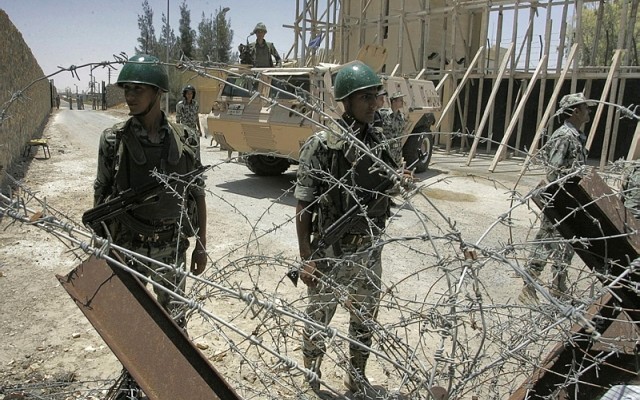The wall would be constructed on the Egyptian side of the Gazan border, but Cairo is resisting the idea.
By Batya Jerenberg, World Israel News
The IDF says that in order to completely defeat Hamas, an anti-smuggling wall must be built under the ground of the Egyptian-Gazan border near Rafah, but Cairo isn’t buying into the idea yet.
The staggering number of armaments of all kinds that Israeli soldiers have been finding hidden in Gazan tunnels, schools, hospitals and private homes, including all together thousands of grenades, guns, bullets, RPGs, explosive devices, rocket launchers and more, has led Israel to conclude that the only way Hamas managed to accumulate so much weaponry was by smuggling it in via Egypt.
Israel has always tightly controlled its two land crossings into Gaza, and also maintains a sea blockade for the purpose of keeping all arms out of the coastal enclave.
Egypt built a concrete wall with underground parts a few years ago in order to thwart Hamas smuggling attempts, but it is only some three kilometers (two miles) long and goes from the southern tip of Gaza up to the Rafah crossing. It also flooded existing Hamas tunnels with seawater to shut them down, a method Israel is now using in a limited way in parts of the vast underground system it has found in the northern part of the Strip that is in its full control.
The current planned barrier would reportedly stretch up to 13 kilometers (eight miles) along the so-called Philadelphi axis, a narrow corridor of border land that Israel used to patrol but gave control of it to Egypt after it unilaterally disengaged from Gaza in 2005 and forcibly evacuated some 8,000 citizens from the enclave.
Constructed on the Egyptian side, it would be sown with sensors to detect digging, much like the long wall the IDF completed between Israel and the Gaza Strip in 2021. The underground part of the multi-billion shekel barrier seemingly stopped the danger of Hamas terrorists crossing the border via tunnels, as it had done before, but on October 7its terrorists broke through the above-ground part in over two dozen places to invade Israel and massacre 1,200 people, setting off the current war.
For their part, the Egyptians deny that Hamas has been able to smuggle weaponry in through Rafah, but this does not take into account the mostly-open areas to the crossing’s north.
Ynet reported that Defense Minister Yoav Gallant discussed the idea last week with U.S. Secretary of Defense Lloyd Austin when his counterpart came to Israel. It is unclear whether he asked for American intervention to overcome Egyptian resistance to the proposal.
This plan could only take place with Cairo’s cooperation, as Israel would presumably not risk its peace agreement with Egypt by forcibly taking over the Philadelphi axis and staying there permanently, which would be a clear breach of its commitments to the deal.
Channel 14’s military reporter Hallel Bitton Rosen reported Tuesday that Gallant told the Knesset’s Foreign Affairs and Defense Committee that as of now, the IDF has no plans to conquer the Rafiah area where the crossing is located and the Philadelphi corridor. The journalist then quoted an unnamed senior IDF official who said, “If that’s the case, it’s preferable to get out of Gaza now and not endanger more soldiers. Without Philadelphi and Rafiah we won’t reach the required goal.”
Israeli Army radio had reported almost two weeks ago that the IDF was planning to build this underground wall, citing an Israeli official who said that “The Egyptians understand Israel’s security need for this.”





